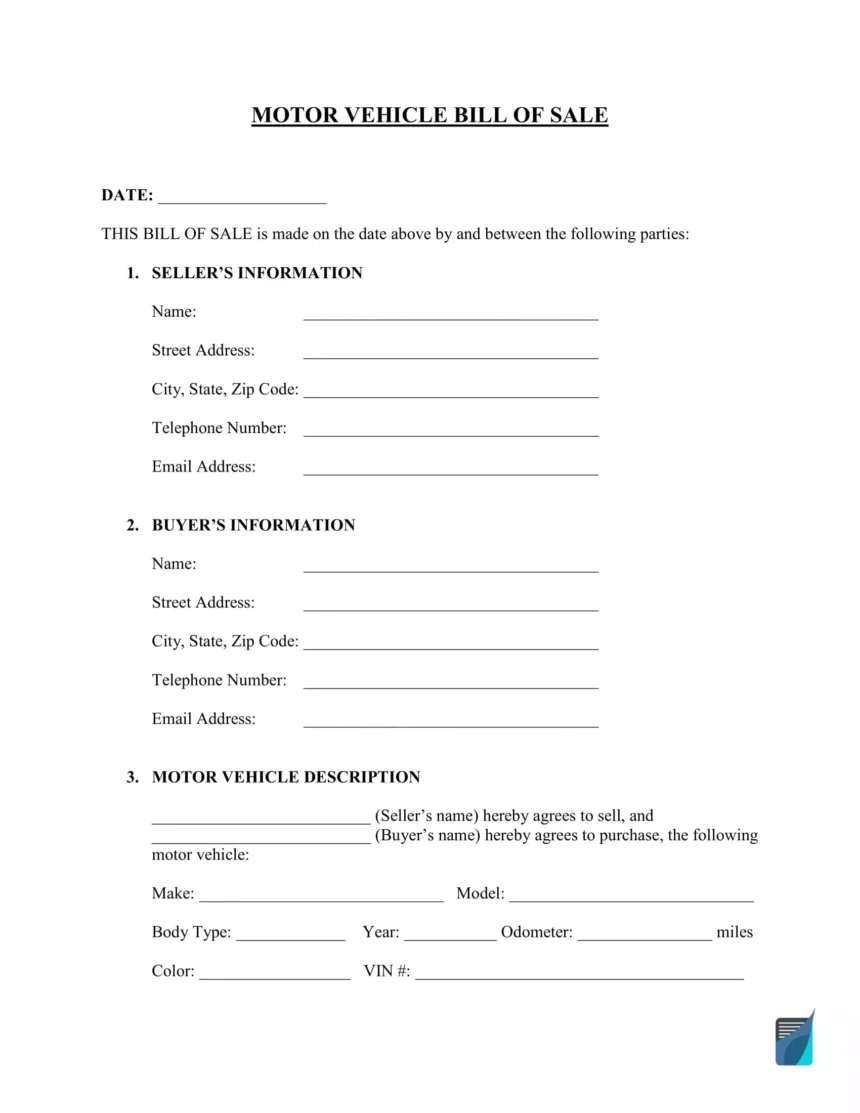In the realm of legal transactions, few documents carry as much weight as the bill of sale. Often overlooked or hastily drafted, this seemingly mundane piece of paperwork serves as a crucial safeguard for both buyers and sellers. From vehicles to real estate, the bill of sale plays a pivotal role in documenting the transfer of ownership and protecting the interests of all parties involved. In this comprehensive guide, we will delve into the intricacies of the bill of sale, exploring its significance, key components, and the importance of ensuring its accuracy.
What is a Bill of Sale?
At its core, a bill of sale is a legal document that records the transfer of ownership of an asset from one party to another. While its format may vary depending on the nature of the transaction and local regulations, a typical bill of sale includes essential details such as the identities of the buyer and seller, a description of the asset being sold, the purchase price, and the date of the transaction. Whether you’re buying a used car or selling a piece of artwork, having a properly executed bill of sale can provide peace of mind and prevent potential disputes down the line.
The Legal Significance of a Bill of Sale:
While not always a legal requirement, a bill of sale carries significant legal weight in many jurisdictions. In essence, it serves as tangible evidence of a contractual agreement between the buyer and seller, outlining the terms and conditions of the transaction. In the event of a dispute or legal challenge, a well-drafted bill of sale can serve as crucial evidence in court, helping to establish the intentions of the parties involved and clarifying any ambiguities surrounding the sale.
Types of Bill of Sale:
There are various types of bills of sale tailored to specific types of transactions. One of the most common is the vehicle bill of sale, which is used to document the sale of a motor vehicle between private parties. This document typically includes details such as the vehicle’s make, model, VIN number, odometer reading, and any warranties or guarantees provided by the seller. Other types of bills of sale include those for real estate, personal property, and business assets, each serving to formalize the transfer of ownership in their respective contexts.
Key Components of a Bill of Sale:
While the specific requirements may vary depending on the jurisdiction and the nature of the transaction, there are several key components that are typically included in a bill of sale:
- Parties Involved: This section identifies the buyer and seller by their legal names and addresses. It’s essential to accurately spell out the full names and addresses to avoid any confusion or discrepancies.
- Description of the Asset: A detailed description of the asset being sold is crucial for clarity and identification purposes. For vehicles, this may include make, model, year, VIN number, and mileage, while for real estate, it may include the property address and legal description.
- Purchase Price: The agreed-upon purchase price should be clearly stated in the bill of sale, along with any additional terms or conditions related to payment, such as installment plans or financing arrangements.
- Date of Sale: The date when the transaction took place is another essential element of the bill of sale. This helps establish the timeline of events and ensures that both parties are aware of when the transfer of ownership occurred.
- Signatures and Notarization: For added legal validity, the bill of sale should be signed and dated by both the buyer and seller. In some cases, it may also require notarization by a licensed notary public to certify the authenticity of the signatures.
Importance of Accuracy and Completeness:
Ensuring the accuracy and completeness of a bill of sale is paramount to avoid potential legal issues or disputes in the future. Any discrepancies or omissions in the document could lead to confusion regarding the terms of the transaction or the rights and obligations of the parties involved. As such, it’s essential to carefully review the bill of sale before signing to verify that all information is correct and all parties are in agreement.
Legal Implications of a Bill of Sale:
From a legal perspective, a bill of sale serves as prima facie evidence of a valid contract between the buyer and seller. By signing the document, both parties acknowledge their acceptance of the terms and conditions outlined therein, including the transfer of ownership of the asset in question. In the event of a breach of contract or dispute arising from the transaction, the bill of sale can be presented as evidence in court to support the claims of either party.
Conclusion:
In conclusion, a bill of sale is far more than just a piece of paper – it’s a vital legal instrument that safeguards the interests of both buyers and sellers in a wide range of transactions. By documenting the transfer of ownership in a clear and comprehensive manner, a well-drafted bill of sale provides certainty and clarity to all parties involved, helping to prevent misunderstandings and disputes down the line. Whether you’re buying a car, selling a house, or transferring ownership of any other asset, having a properly executed bill of sale is essential for protecting your rights and ensuring a smooth transaction process.
Read Also: Unraveling Barry Keoghan Joker Potential Role: A Deep Dive into Casting Speculations







